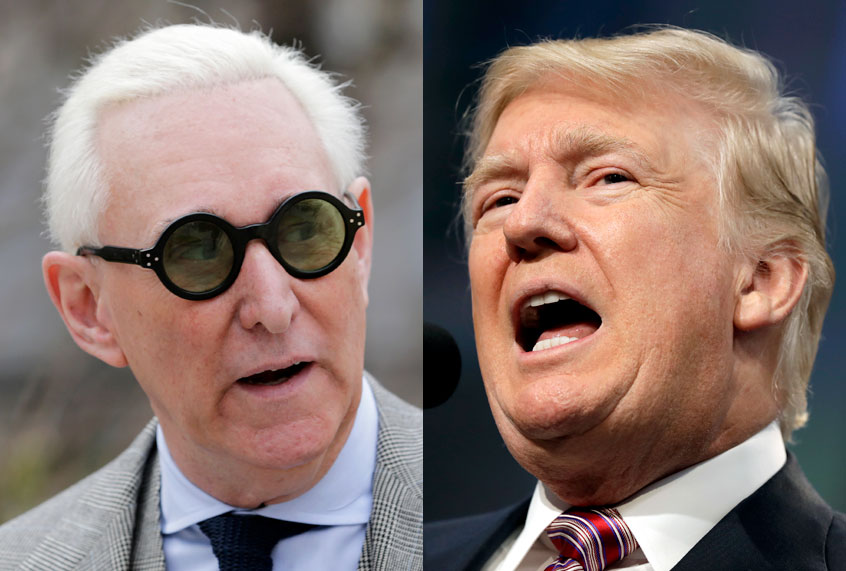Roger Stone, a longtime associate and informal adviser to President Donald Trump, was arrested by the FBI on Friday on charges that he tried to tamper with a witness to hide the details of his attempts to learn about releases of a trove of damaging emails stolen from Democrats during the 2016 presidential campaign. He was indicted on seven counts as part of special counsel Robert Mueller’s probe, including one count of obstruction of an official proceeding, five counts of making false statements and one count of witness tampering.
Following the early morning arrest at his home, Stone appeared briefly at a federal courthouse in Fort Lauderdale, Florida. According to the Washington Post, Stone claimed he had been falsely accused and would not testify against President Donald Trump.
“I will plead not guilty to these charges. I will defeat them in court,” Stone told a crowd outside the courthouse.
“There is no circumstance whatsoever under which I will bear false witness against the president, nor will I make up lies to ease the pressure on myself. I look forward to being fully and completely vindicated,” he continued. “I will not testify against the president, because I would have to bear false witness.”
The newspaper said he was “wearing a blue polo shirt, jeans and steel shackles on his wrists and ankles” and that a judge ordered him released on a $250,000 bond.
Mueller’s indictment alleges that Stone sought to gather information about hacked emails at the direction of an unidentified senior Trump campaign official, identified by CNBC as former White House chief strategist and Trump campaign CEO Stephen Bannon. The indictment further focuses on Stone’s attempts to find out when potentially damaging emails stolen from Hillary Clinton’s campaign would be published by Julian Assange, the publisher of the whistleblower website WikiLeaks whom Stone previously called “my hero.” Prosecutors have said Russian intelligence agents hacked Democrats and their email accounts and then shared them with WikiLeaks, which published them during the final months of the 2016 election.
WikiLeaks made two separate email dumps during the heated 2016 race that altered the trajectory of the presidential election. In July, Mueller indicted 12 Russian intelligence officers in a sustained effort to hack the computer networks of the Democratic National Committee, Hillary Clinton’s presidential campaign and the Democratic Congressional Campaign Committee in the weeks ahead of the 2016 election. The damaging emails were released by WikiLeaks. At the time, Deputy Attorney General Rod Rosenstein claimed the hackers created false online personas, DC Leaks and Guccifer 2.0, in an attempt to disguise the Russian origins of their work. After the election, Stone admitted exchanging direct but benign messages with Guccifer 2.0 over Twitter.
Stone has repeatedly denied any contact with Russia or WikiLeaks. He has claimed that he had no prior knowledge that WikiLeaks had hacked Democrats emails and would release them ahead of the election, saying the predictions he made about the group’s plans were based on Assange’s public remarks and tips from associates with inside knowledge. In sworn testimony to the House Intelligence Committee last year, Stone said he did not intend to suggest that he had communicated with Assange directly. WikiLeaks and Assange have also said they never communicated with Stone.
With Stone’s indictment, Mueller has now charged 34 people and secured guilty pleas from six Trump associates or advisers, including former campaign chairman Paul Manafort, former deputy campaign manager Rick Gates, former national security adviser Michael Flynn, former Trump attorney Michael Cohen and former campaign aide George Papadopoulos. The Washington Post noted, “None of those previous charges included allegations that Trump associates conspired with Russia to interfere in the election — one of the main thrusts of Mueller’s probe.”
Trump has vehemently denied all allegations of collusion with Russia during his 2016 presidential campaign and has repeatedly railed against Mueller’s investigation into the matter as a politically-motivated “witch hunt” and a “hoax.” The president has also accused Mueller’s team of “viciously telling witnesses to lie about facts,” comparing the probe to the McCarthy period, named for former Sen. Joseph McCarthy (R-Wis.), who accused hundreds of Americans of being communists or communist sympathizers in the 1950s.

